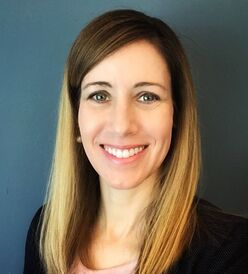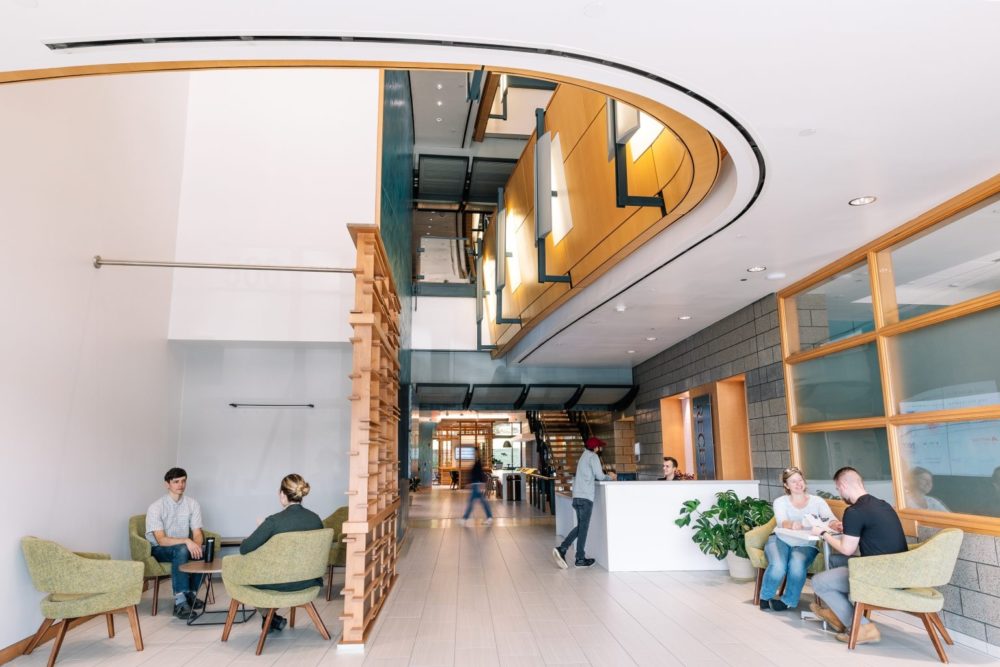If you’re a woman and an entrepreneur, you’ve faced challenges.
In an informal poll conducted by Technical.ly, we found that many women founders in Delaware have struggled to be taken seriously in industries ranging from hospitality to marketing. It shows up in the data, too: Only 2.8% of venture capital went to companies with all-women founding teams in 2019 — and the pandemic made the percentage drop to 2.3%, undoing pre-pandemic gains.
The science and technology fields bring their own challenges for women, but founders in Delaware are sustaining and leading some innovative teams within them, even with the additional hardships of COVID-19 over the past year. Technical.ly talked to three women leading STEM startups, all of which are based at Wilmington’s Delaware Innovation Space (DIS), about how their companies are growing, how they’re funded, and how they’re supporting new generations of girls to enter the competitive but sometimes world-changing STEM fields.
Capturing carbon

Joanne Norris. (Photo via LinkedIn)
Joanne Norris, a third-year Ph.D. candidate at University of Delaware, launched Carbon Reform with business partner Nick Martin last February. The startup, which is not affiliated with UD, is developing a modular carbon capture device for commercial buildings that will remove indoor carbon buildup that results when many people are in an indoor space breathing the same air, even if it’s ventilated. At certain levels, that Co2 buildup can lead to symptoms like headaches, tiredness and lack of productivity, Norris said.
Carbon Reform is designing polymer mesh-based retrofit systems for existing HVAC systems that physically remove the excess CO2, turning it into solid calcium carbonate, or old-fashioned chalk.
“You can use it for soaps, and a lot of different things,” said Norris. “The good thing about it is it’s basically a transporter for CO2, so if you wanted to use the CO2 itself down the line, you can. You can free it up and make it into a fuel or a chemical.”
As a startup still in its first year, Carbon Reform launched with the help of a friends-and-family funding round, and the team is planning an angel investment raise this summer.
“We haven’t done our full proof of concept yet, but all of the chemistry has been tested a lot,” said Norris. “There are certain formulations that are proprietary. We’re starting to develop the mechanics of the system, we’ve built virtual models, and we have a couple of organizations committed to helping us do the pilot testing when we’re ready.”
https://www.instagram.com/p/CMk15nOl-88/?utm_source=ig_web_copy_link
Norris didn’t necessarily set out to be a scientist. A professional artist since the age of 16, she attended undergraduate school at Hofstra University with majors in economics and sustainability and a minor in fine arts. As only the second student to declare sustainability as a major, she wound up taking several pre-med courses. That was followed by a masters at Columbia University in climate and society, during which time she took a non-required environmental engineering course, where she first learned about carbon capture.
“I got into the Ph.D. program at UD studying material science because I was wondering if it would help me do what I’m doing now — convert CO2,” Norris said. “And it does. I ended up studying polymers; my Ph.D. work is actually biodegradable polymer systems.”
Future plans for Carbon Reform include a workforce development program that employs formerly incarcerated people.
Sustainable aquaculture solutions

Mary Larkin. (Photo via LinkedIn)
Mary Larkin, Ph.D., is CEO and cofounder of Gaskiya Diagnostics, which began in it’s current iteration in July 2019. The company makes rapid diagnostic tests for aquatic diseases in order to reduce losses of shrimp, mollusks and other farmed fish.
If you feel like you’ve heard the name recently (and you’re not in the aquaculture field), it could be because Larkin recently participated in the Startup 302 pitch competition and came away with $35,000 in grant money from the Delaware Division of Small Business and FMC.
In August, Gaskiya also received the DIS First Fund investment that moved the lab portion of the company to the DIS from Baltimore.
“We’ve had two equity partners: First Fund and the HATCH Blue International Sustainable Aquaculture Accelerator program,” Larkin said. Gaskiya has also received funding through the National I-CORPS program, a Small Business Innovation Research (SBIR) grant from the U.S. Department of Agriculture and National Institute of Food and Agriculture, and a Maryland Industrial Partnerships grant, “which is a partnership between startups and university researchers.”
The low-cost, paper-based diagnostic tests — think: pregnancy tests — reduce the need for expensive diagnostic equipment and aim to lead to faster treatments and bigger harvests. The tests are still in the development stage.
“It’s all about getting that complete, validated prototype for an aquaculture target,” Larkin said. “The technology has actually been proven out in human diagnostics, but our company’s focus is on applying that to aquaculture and eventually more broadly in agriculture. Getting that prototype is really going to open up opportunities for our next big scale-up, so we’re bringing in some private investment so that we can really expand our pace of development and the expansion of the products that we offer.”
‘Inventors for hire’

Debora Flanagan Massouda. (LinkedIn)
Debora Flanagan Massouda, Ph.D., one of the founders of Delaware Polymers R&D, came into the startup world from different direction. A longtime employee of DuPont, she left the chemicals company when it got rid of its central research department in 2016.
“We all got together and we started a nonprofit with visions of doing grant-funded research and STEM education,” Massouda said. “We had several lists of things to do that would qualify [the org] as a nonprofit, but then some of us wanted to do contract R&D and that didn’t count as nonprofit, so the nonprofit started this for-profit business.”
Delaware Polymers doesn’t have a physical product. Instead, “I like to say we’re inventors for hire,” Massouda said.
DuPont, and the connections made through the company, have helped the startup, beginning with a retainer to help it get started. It also received a grant from The Longwood Foundation. The company was also one of the first to work out of DIS, which itself is a partnership between DuPont, UD and state government.
When we first left DuPont, we had biologists and mechanical engineers, but it turned out that our skillset in polymer science is what really we've been able to sell.
With no product, SBIR grants have been more difficult to get, so its team relies on paid consulting work for funding. The company’s biggest selling point, as the name implies, is polymers.
“When we first left DuPont, we had biologists and mechanical engineers, but it turned out that our skillset in polymer science is what really we’ve been able to sell,” Massouda said. “I have a Ph.D. in chemical engineering but became a material scientist over the years. We’ve been able to stay busy now for four-and-a-half years. It’s looking like a viable business.”
It helps that polymers are often used in R&D for sustainable solutions, which are on many CEOs’ minds — “polymer science is having a comeback with the demand for everything recyclable and [biodegradable] and biosourced,” she said. Clients have hired Delaware Polymers to find solutions when creating things like films, adhesives, barrier coatings for food packaging and even recycled railroad ties.
Running the business hasn’t been without its challenges.
“I’ve hired about 28 people over the past four years, almost all of them part-timers,” she said. “I say that our biggest obstacle is that I can only hire people who don’t need to work, because I have these project that are three months or six months long, so I’m not going to be able to hire someone just out of school, but someone who is semi-retired and can work on a project basis, or interns.”
Still, Massouda said, it’s been sustainable.
“We keep going, even through the pandemic,” she said. “Our biggest client really appreciated that we could come in to work — they’re in San Francisco, they were not allowed to go into their labs at all. We were collaborating with them [while] they were at home, we were in the lab. It’s been tight over the last year, but on the other hand, some of the work has kept going because of the pandemic.”
So, what can be done to support the women scientist entrepreneurs of the future?
The number of women in STEM careers in the United States has increased overall from 8% to 27% over the last 50 years or so. Still, there’s work to be done before parity is reached.
Proposed solutions range from an early emphasis on tech education for girls, to increased mentorship for women looking to enter (and stay in) the field, to more supportive workplaces for women in general. What do these founders think can be done?
Larkin called for more programming that targets women as potential entrepreneurs.
“When I was a graduate student, I was part of an entrepreneurship program for science graduate students and they definitely made an attempt to make sure they were reaching everybody who was interested in that program,” she said. “Women in certain fields are already underrepresented in science and entrepreneurship, so I think that, specifically in science entrepreneurship, there needs to be a concerted effort and more programs at universities that are attracting [women] and making sure that they’re offered a seat at the table.”
And Delaware Polymers’ cofounder said it’s partly a branding challenge.
“It does have to start at the universities, or even before the universities,” said Massouda, who mentors a high school robotics team. “I think that making science appealing to girls is important. Somehow there’s this idea that science is nerdy, it’s not feminine. I’ve heard girls say, ‘I want to work with people’ — well, you work with people in science. I think somehow that gets missed, and the creative aspects of it get missed. You create things in science.”
Before you go...
Please consider supporting Technical.ly to keep our independent journalism strong. Unlike most business-focused media outlets, we don’t have a paywall. Instead, we count on your personal and organizational support.
Join our growing Slack community
Join 5,000 tech professionals and entrepreneurs in our community Slack today!

The person charged in the UnitedHealthcare CEO shooting had a ton of tech connections

From rejection to innovation: How I built a tool to beat AI hiring algorithms at their own game

Where are the country’s most vibrant tech and startup communities?


